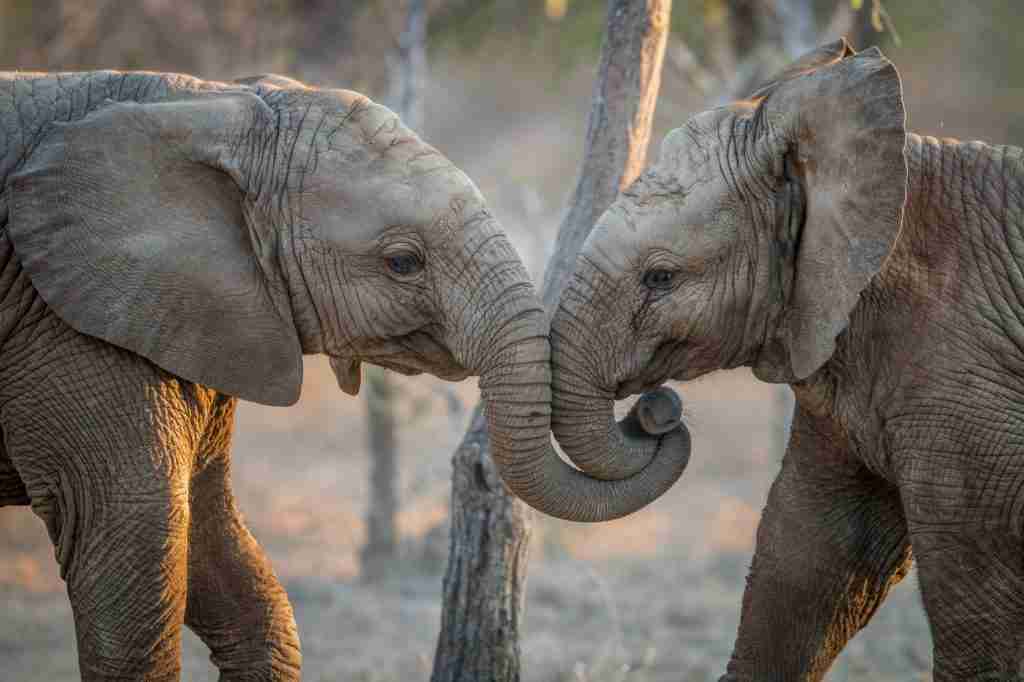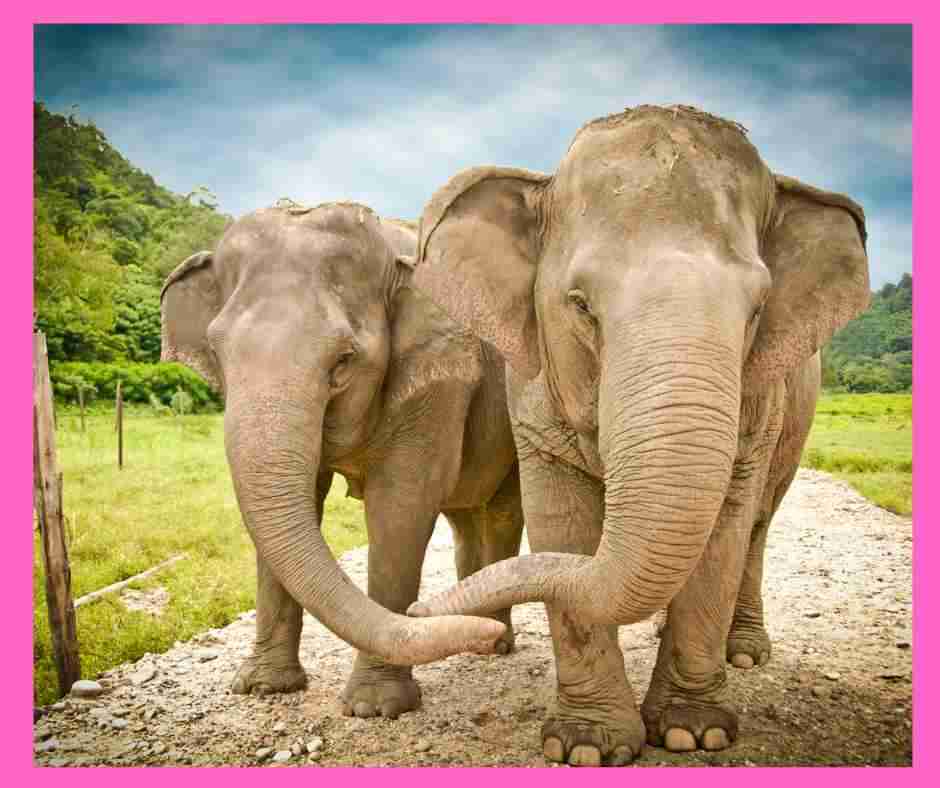The sisterhood of female elephants-14 inspiring facts
I received a beautiful elephant ornament as a gift from my Gal Pal Anne. She had gifted this to group of ladies to express gratitude for their support during a difficult time. Along with the gift was a description about why female elephants stick together during difficult times.
I became curious and started researching to discover why these majestic creatures are so special. Did you know that female elephants are fierce leaders?
They collaborate and support other female elephants, their empathetic and have better social intelligence than some humans. We can learn a lot from elephants. I am excited to tell you all about the elephant sisterhood story. Let’s go!
Why Female Elephants Are The Best Gal Pals
Female elephant tribes are true badasses in the wild! They fiercely protect their sisters by circling around them, standing guard and kicking dust to mask their scent from predators. They are some of the best gal pals on earth.
We humans are cut from the same cloth. Sometimes we’re the ones needing protection, and sometimes we’re the fierce protectors kicking up dust with unwavering love. But we’re all in this circle of life together, and it’s what makes us who we are.
Female Elephants Are Our Soul Sisters
A cow (female elephant) can be seen as soul sisters in the wild world we live in. They serve as a source of inspiration for girls and women. They show us how to tap into our girl power and become a boss babe. Adult female elephants are truly remarkable creatures, and we can learn valuable lessons from their strength, beauty and social gifts.
One notable characteristic of female elephants is their social structure, which revolves around the matriarch and female elders. This leadership team acts as the glue that unifies the entire herd.

Embracing Individuality
Female elephants understand the importance of individual differences within the group. For example, some may have a better sense of detecting predators or understanding the nuances of their environment.
By embracing individuality, female elephants ensure the protection of the more vulnerable members of the herd, like the young and the elderly.
From this, we can learn the importance of embracing individuality.
In the business world, building trust and showing respect for one another are vital. Doing this, creates a compassionate culture, which allows leaders to lead with empathy.
Perhaps we should strive to embody the characteristics and social behaviors of female elephants and aspire to become a part of their sisterhood.

14 Thing We Can Learn From Female Elephants About Friendship and Sisterhood
1. Live with grace- Tread lightly
Elephants are unique among mammals in that they walk on their toes, rather than on their soles. This allows them to be more agile and nimble.
Elephants are also known for their slow and deliberate movements, which further reduces their impact on the ground.
If we live our life with more grace, then:
- When we live with grace, we approach others with kindness, compassion, and understanding. This can lead to improved relationships with friends, family members, and coworkers. We may be more forgiving of others’ mistakes, listen more attentively, and be more patient in difficult situations.
- Living with grace can also increase our overall sense of happiness and well-being. By cultivating a more positive outlook, we may experience less stress and anxiety, and more joy and contentment in our daily lives.
- Graceful living involves a deep level of self-awareness and reflection. When we take the time to understand our thoughts, emotions, and actions, we may gain a better understanding of ourselves and our place in the world. This can lead to a greater sense of purpose and fulfillment in life.

2. Develop better social intelligence
Elephants do not dominate in their social networks. They do not lead through fear, rather through respect and shared responsibility.
This requires self-awareness, social skills, empathy, and emotional intelligence. Elephants maintain authentic relationships with others in their herd through a close social network of work and play. The herd trusts the matriarch because of these bonds, acting as one unit as they follow her lead.
Elephants are known for their complex social behavior and strong social bonds. These bonds provide some important lessons about social intelligence for humans.
We Connect With Others Better With More Social Intelligence
Social intelligence is the ability to understand and navigate social situations effectively. If we all developed better social intelligence, we can better understand and connect with others.
When we learn to read emotional cues, we can build stronger connections and communicate more effectively.
We can become more compassionate and understanding when we put ourselves in others’ shoes and see things from their perspective. Leaders who are socially intelligent are better able to inspire and motivate others, build trust and respect, and manage conflicts.
Overall, developing social intelligence can help us become better people. Why? By improving our relationships, enhancing our empathy, improving our communication skills, developing our leadership skills, and increasing our self-awareness.
3. Don’t judge others
Elephants use a wide range of vocalizations, body language, and even vibrations to communicate with each other. The bottom line is that they don’t judge others. They don’t label other elephants and put them in boxes.
They embrace each other’s individuality and are self-aware. Elephants can recognize themselves in a mirror, a trait only shared with great apes and bottlenose dolphins. Did you know that they can also be left- or right-trunked? My point? The importance of knowing your strengths cannot be overstated. It is also important to know when to use them.
Female elephants communicate can convey a wide range of emotions and intentions. It’s so impressive! Elephants teach us to be more attentive and responsive to the nonverbal cues and signals of those around us.

4. Cooperate with others
Elephants are highly cooperative animals. They work together to accomplish tasks such as protecting their young or finding food and water. The herd mates is a pack of badasses. As well as mourning their dead, elephants are also known to take part in funeral-like behaviors.
Humans can learn from elephants by valuing cooperation and interdependence.
5. Have more empathy
Elephants have been observed showing empathy for others in their social group, and even for individuals of other species. They may comfort each other when distressed, and will sometimes extend help to other elephants in need.
Humans can learn from elephants by cultivating empathy and compassion for others. By recognizing that we are all interconnected in important ways.
In order to comfort distressed herd members, elephants have been known to give hugs and make sympathetic clicking sounds. The bond between herd members runs so deep that they grieve, bury, and even cry for their deceased loved ones.
Developing empathy can bring numerous benefits to our personal and professional lives. Benefits include improved relationships, enhanced communication skills, increased emotional intelligence, improved teamwork and collaboration, and increased social awareness and responsibility.

6. Celebrate Traditions
Elephants are known for their long memories, and can remember individuals and places for many years. They also pass down knowledge and social customs from generation to generation.
We can learn from elephants by valuing the importance of memory and history. Also, by recognizing that our experiences and relationships shape who we are today.
Dr. Moss who has studied elephant behavior, shares that “elephants have a complex social hierarchy based on age, experience, and family relationships, and that they have the ability to recognize and remember individual elephants for many years.” This is part of how elephants celebrate traditions.
Overall, elephants provide a fascinating example of social intelligence in the animal kingdom. Humans can learn important lessons from their behavior and social interactions.
Why is it important for us to celebrate traditions?
Traditions are an important part of cultural heritage. By cultivating them can help to preserve and celebrate the history, values, and customs of a society. This can help to maintain cultural diversity and promote a sense of pride and identity within a community.
Traditions can also bring people together and build a sense of community. Cultivating traditions can also foster respect and understanding between different cultural groups.

7. Be playful and enjoy life
Female elephants are known for their playful behavior, and there are important lessons that humans can learn from their playfulness.
Elephants use play to learn and practice important skills, such as coordination and communication. Humans can learn from elephants by recognizing the value of play. We could all use more fun in our lives. Play more pals.
Investing Time and Energy Into Building and Maintaining Relationships
When elephants engage in play with other elephants it can help strengthen their social bonds. This also reinforces their place in the social hierarchy.
Humans can learn from elephants by recognizing the importance of social connections and investing time and energy in building and maintaining relationships with others.
Overall, being playful and joyful can have many positive effects on our mental, emotional, and physical well-being. These attributes contributes to a sense of contentment, happiness, and fulfillment in life.

8. Connect and strengthen your friendships
Social strong bonds are important to female elephants, and they work to strengthen and maintain these bonds throughout their lives. Just like us, the ones who cherish our friendships live happier lives.
By recognizing the importance of social connections in our own lives we would invest in our relationships with others. Cherishing our dearest friends.
And female elephants keep in touch with their Gal Pals through frequent exchanges of low-pitched vocalizations called rumbles.
“We liken it to an elephant cellphone,” said Joseph Soltis, a research scientist who works with elephants at Disney’s Animal Kingdom in Florida. “They’re texting each other, I’m over here. Where are you?”

9. Collaborate With Other Women
Female elephants care for their offspring and support each other. Humans can learn from this by recognizing the benefits of cooperation and collaboration.
Female elephants take on the important role of caring for the younger members of their herd, ensuring their survival and success. Parents can learn from this by recognizing the importance of caretaking and nurturing in our own lives. This is true whether we are caring for children, elderly relatives, or others in need of support.
Collaborating with other women can provide a sense of support and community. Women may share similar experiences and challenges, and working together can help build a sense of solidarity and understanding.
10. Mentor 0ther women
In elephant herds, older, more experienced cows often take on the role of leaders and mentors. They help to guide and protect the younger females and their offspring.
The value of mentorship and seeking opportunities to learn from those who are more experienced is key. We should consider seeking the opportunity to connect with mentors as well as mentor others.
Spending time with our Gal Pals more often builds trust and deeper connections.
11. Build lifetime social bonds & friendships
Throughout their lives, female elephants strive to maintain and strengthen their social bonds with other females in their herd.
Girlfriends… we can learn from this by recognizing the importance of social connections in our own lives and investing in our relationships with others.
Female elephants form strong social bonds with other females in their herd and work together to care for their offspring. We can learn from this by recognizing the importance of building and maintaining strong social connections with other women.
Let this inspire us to form lifetime bonds and strengthen bonds to promote social cohesion.
12. Be resilience and learn to adapt
Female elephants are adaptable creatures that can adjust to changing environments and circumstances. They can travel long distances in search of food and water and navigate through unfamiliar terrain.
Female elephants face many challenges in their lives, from predators and environmental threats to changes in their social group. The importance of resilience and adaptability in navigating the challenges and changes in their own lives is important.
Develop thick skin
Our roads in life feel uncertain and can be very rough. Instead of being scared or intimidated during hard times, we need to think “ What would a female elephant do?” Have a thick skin not fragile skin.
We can learn the importance of resilience and perseverance in our own lives. When we encounter setbacks or failures, we can draw inspiration from the resilience of female elephants and continue to move forward with determination and courage.

13. Less drama and stress please
There is evidence to suggest that female elephants may have lower levels of stress hormones than male elephants. This is thought to be due in part to the strong social bonds that female elephants form with each other and their young.
Studies have shown that female elephants have lower levels of the stress hormone cortisol than male elephants. In one study, researchers found that female elephants in Amboseli National Park in Kenya had significantly lower cortisol levels than males, even during periods of drought when resources were scarce.
Makes sense to me, no drama- no stress=happier lives. Women who are more authentic live happier lives as well.
Female Elephants Have Lower Levels Of Stress Hormone Cortisol
In addition to social support, other factors may also contribute to lower stress levels in female elephants. For example, female elephants tend to have lower testosterone levels than males, which may reduce aggressive behavior and associated stress.
Female elephants also tend to have longer lifespans than males, which may be related to reduced stress and better overall health. Note to self… chill out sista!
Overall, while more research is needed, there is evidence to suggest that female elephants may have lower levels of stress hormones than males. This is possibly due in part to their strong social bonds and other biological factors.
Humans may not have lower levels of stress hormones but we can learn that less stress in our lives may contribute to more happiness and more friendships celebrating the importance of female friendships.
14. Lead the heard
The oldest female in an elephant herd is always the leader. The matriarch is the oldest and most experienced female in the group, and she plays a vital role within the elephant family.
She is responsible for making decisions about where the group will go to find food and water, and she also helps to protect the family from predators and other threats.
Female Elephants Leadership Qualities Are Impressive
Female elephants are highly social and live in herds. They collaborate with one another to ensure the survival and well-being of the group. As leaders, they prioritize the needs of the group over their own individual interests and work together to achieve common goals.
We can all communicate better yes? Elephants communicate with each other through a variety of vocalizations and body language. As leaders, they are highly skilled at reading the moods and needs of their herd members and adapting their communication styles accordingly.
Leaders With Empathy
Female elephants are known for their high levels of empathy. All leaders should have empathy and compassion for others. Female elephants are able to sense the emotions of other elephants and respond with compassion and care.
As leaders, they prioritize the emotional well-being of their herd members and work to create a supportive and nurturing environment.
Finally long term thinking and planning is another skill female elephants have. As leaders, they take a long-term view and prioritize sustainable solutions that benefit the herd over the short-term gains of individuals.
Mama elephants pass down their knowledge and experience to the younger members of their herd. This knowledge can be crucial for the survival of the group, particularly during times of drought or other environmental challenges.
How Male and Female Elephants Differ?
Female elephants, or cows, are highly social animals that live in groups called herds. These herds are typically led by the oldest and most experienced female, known as the matriarch. Female elephants are responsible for raising the young, and they rely on cooperation and communication to do so.
As a result, female elephants tend to exhibit more social and communicative behaviors, such as touching, vocalizing, and using body language to communicate with one another. They also tend to be more nurturing and protective of the young elephants in their herd.
Male Elephants Are Solitary Animals
Male elephants, or bulls, on the other hand, tend to be more solitary animals. While females hang tight, loosely-knit group of male elephants wonder about.
They may live alone or in small groups, and they are typically only involved with female elephants during mating season. Male elephants also tend to exhibit more aggressive behaviors, such as competing with other males for access to females or resources like food and water. Surprised?
Here are some of the most common questions about female elephants:
Q: How long do female elephants live?
A: Female elephants have a lifespan of around 60-70 years in the wild.
Q: How do female elephants form social groups?
A: Female elephants live in matriarchal social groups that are typically made up of several related females and their offspring. These groups are led by an older female called the matriarch.
Q: How do female elephants communicate with each other?
A: Female elephants communicate with a range of vocalizations, including trumpeting, rumbling, and bellowing, as well as through visual signals such as body language and postures.
Q: How do female elephants give birth?
A: Female elephants have a gestation period of around 22 months, and give birth to a single calf. The calf is born weighing around 120-150 kg and is cared for by its mother and other female elephants in the group.
Q: How do female elephants protect their young?
A: Female elephants are highly protective of their young and will defend them from potential predators or threats. They may also form a protective barrier around the young calves to keep them safe.
Q: How do female elephants migrate?
A: Female elephants may migrate to find food and water sources, and will often travel long distances with their social groups. They are known to have excellent memory, which helps them navigate to areas with the resources they need.
Q: How many young do female elephants have in their lifetime?
A: Mama elephants can have several calves throughout their lifetime. Females typically give birth to one calf every 2-4 years. Giving birth is a female celebration.
Q: How are female elephants threatened?
A: Female elephants are threatened by habitat loss, poaching for their ivory tusks, and human-elephant conflict. Conservation efforts are underway to protect their populations and ensure their long-term survival.
Q: What other female animals bond like elephants?
- Chimpanzees: Female chimpanzees form close social bonds with each other and may spend hours grooming each other, sharing food, and playing together.
- Orcas: Female orcas, also known as killer whales, live in family groups called pods that are led by a matriarch. Female orcas stay with their mothers for life and may also form close bonds with other females in the pod.
- Lions: Female lions live in prides, which are led by a dominant female called a lioness. Female lions within the pride form close bonds and work together to hunt and care for their young.
- Bonobos: Bonobos, also known as pygmy chimpanzees, have a society that is characterized by strong social bonds between females. Female bonobos are dominant over males and may engage in sexual behavior with each other as a form of social bonding.
- Dolphins: Female dolphins are highly social animals that live in groups called pods. Female dolphins within a pod may form close bonds with each other and engage in activities such as swimming together and babysitting each other’s young.
new life







